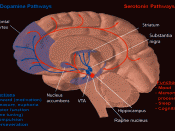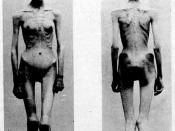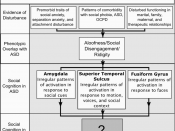Anorexia
In today's society, we often hear of people who suffer daily from illnesses such as cancer, AIDS, obsessive-compulsive disorder, phobias, downs syndrome and many other types of illnesses both communicable and non-communicable. What about the illness that consumes the life of over eight million Americans, 90 percent being women? Anorexia nervosa, in medicine, is a condition characterized my intense fear of gaining weight or becoming obese, as well as a distorted body image. This can lead to many different problems.
People who intentionally starve themselves or severely restrict their food intake suffer from an eating disorder called anorexia nervosa. The disorder, which usually begins in young people around the time of puberty, involves extreme weight loss -- at least 15 percent below a young woman's normal body weight. Those experiencing anorexia nervosa also have an intense fear of becoming fat, even though they are underweight. Many people with the disorder look emaciated but are convinced that they are overweight.
Sometimes they must be hospitalized to prevent starvation, yet they often continue to deny the condition. Food and weight become obsessions. For some, the compulsiveness shows up in strange eating rituals or the refusal to eat in front of others. It is not uncommon for people with anorexia to collect recipes and prepare lavish gourmet feast for family and friends, but not partake in the meals themselves. They may adhere to strict exercise routines to keep off weight.
The exact cause of anorexia nervosa remains unknown. People with anorexia may believe that they would be happier and more successful if they were thin. Anorexics tend to be perfectionists. They want everything in their lives to be perfect. People suffering from this illness are typically good students and are involved in many school and community activities. They tend to blame themselves...


